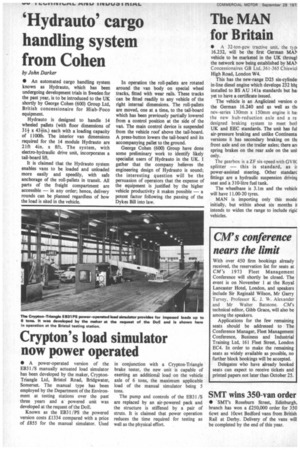'Hydrauto' cargo handling system from Cohen
Page 38

If you've noticed an error in this article please click here to report it so we can fix it.
by John Darker • An automated cargo handling system known as Hydrauto, which has been undergoing development trials in Sweden for the past year, is to be introduced to the UK shortly by George Cohen (600) Group Ltd, British concessionaire for Hiab-Foco equipment. Hydrauto is designed to handle 14 wheeled pallets (with floor dimensions of 31+ x 434-in.) each with a loading capacity of 11001b. The interior van dimensions required for the 14 module Hydrauto are 21ft 4in. x 8ft. The system, with electro-hydraulic drive unit, incorporates a tail-board lift. It is claimed that the Hydrauto system enables vans to be loaded and unloaded more easily and speedily, with safe anchorage of the roll-pallets in transit. All parts of the freight compartment are accessible — in any order; hence, delivery rounds can be planned regardless of how the load is sited in the vehicle. In operation the roll-pallets are rotated around the van body on special wheel tracks, fitted with wear rails. These tracks can be fitted readily to any vehicle of the right internal dimensions. The roll-pallets are moved, one at a time, to the tail-board which has been previously partially lowered from a control position at the side of the van. The main control device is suspended from the vehicle roof above the tail-board. A press-button lowers the tail-board and its accompanying pallet to the ground. George Cohen (600) Group have done some preliminary work to identify likely specialist users of Hydrauto in the UK. I gather that the company believes the engineering design of Hydrauto is sound; the interesting question will be the persuasion of operators that the expense of the equipment is justified by the higher vehicle productivity it makes possible — a potent factor following the passing of the Dykes Bill into law.












































































































